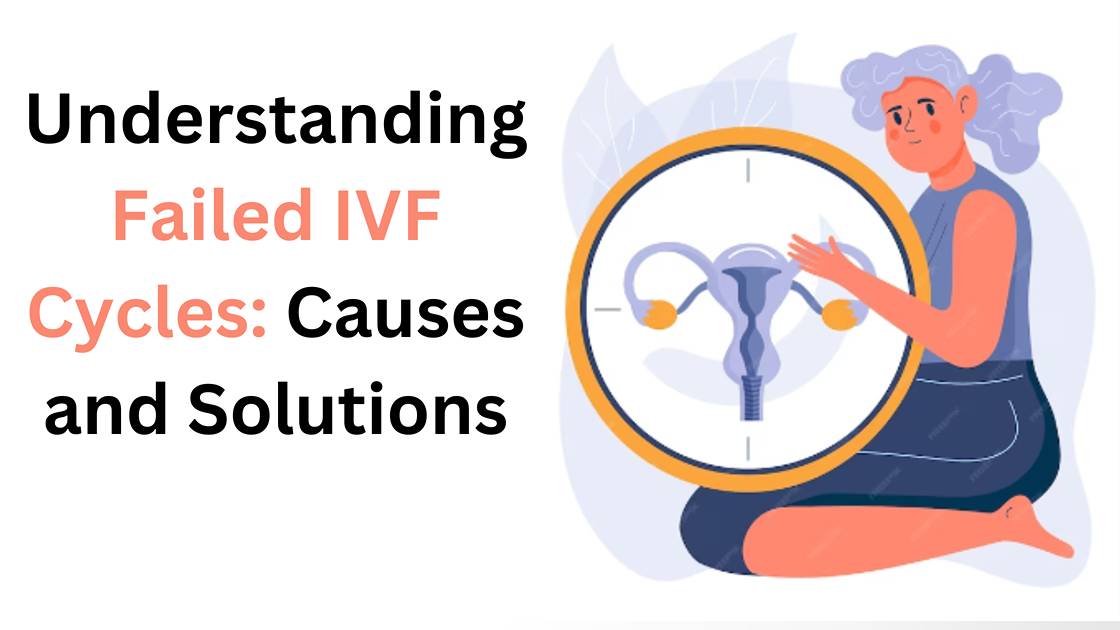
Understanding Failed IVF Cycles: Causes and Solutions
Have you ever wondered whether an IVF process can fail? Success stories are all too common, and of course, they bring a lot of hope. However, there is also the other side of the coin. In this blog, we will discuss why an IVF might fail and what solutions exist in such cases.
Why Do IVF Cycles Fail?
Like every biological event, pregnancy has inherent complexities. Several factors work together to determine its eventual success or failure. IVF is not an exception.
Here are the most common reasons that could lead to an unsuccessful IVF cycle.
Poor egg reserves: The quality and quantity of eggs significantly impact the overall success rate of fertilization and implantation. Women over 35 tend to have lower ovarian reserves—even then, the limited yield of eggs may be deemed low quality upon retrieval. Embryos fertilized using such eggs from relatively older women also have higher probabilities of developing genetic abnormalities.
Embryo abnormalities: Successful egg retrieval and fertilization does not guarantee normal embryo development. Abnormalities may occur due to chromosomal or genetic issues and are the biggest reason for failed IVF cycles. Due to the presence of such abnormalities, an embryo may not get implanted in the uterus and lead to an episode of miscarriage.
Endometrial disorders: For a successful pregnancy, the embryo should be implanted on the uterine lining or endometrium. Issues such as the presence of polyps or fibroids or lack of optimum thickness often hinder this process.
Challenges with embryo transfers: In the transfer process, the embryo is placed inside the uterus, and this process needs to be carried out with extreme care for a successful implantation. A catheter, which is a thin tube, is used to transfer the embryo. If this catheter faces resistance or the embryo is incorrectly placed within the uterus, it increases the probability of an unsuccessful implantation.
Lifestyle challenges: An unhealthy lifestyle and factors such as obesity, stress, smoking, and excess alcohol consumption have a negative bearing on the success rate of an IVF cycle.
IVF Failure Symptoms
For expecting parents, experiencing a failed IVF cycle can be devastating. However, you need to understand the various causes to plan an effective treatment for the future.
Failed IVF cycle symptoms largely mimic those seen when a woman is on her period, such as bleeding and cramping, as well as a decline in some of the most obvious pregnancy symptoms, such as breast tenderness and nausea. Nevertheless, the symptoms are not always noticeable.
Dealing With IVF Cycle Failures
It is not easy to cope with IVF failures as they take an immense toll on a couple’s emotional and financial well-being. Frustration is common in such situations, but there are ways to overcome setbacks.
Having another go: IVF may require you to take multiple attempts before finally becoming pregnant – consider yourself among the lucky few if you conceive on the first attempt. Before a second attempt, the couple may be asked to undergo certain tests to identify possible conditions hindering the effectiveness of the treatment. Your doctor may also recommend lifestyle changes to help improve your pregnancy success rates. Only after assessing these factors will the doctor give you the go-ahead for a second shot at IVF treatment.
Seeking third-party donors: If problems are found with your extracted eggs, the doctor may recommend seeking a third-party egg donor. A comprehensive screening process is conducted before procuring the donor eggs. Women under 30 usually have healthy eggs and are ideal donor candidates.
Opting for surrogacy: If a woman is unable to fertilize an embryo, be it due to multiple miscarriages or failed embryo implantations, then surrogacy becomes the only viable option. A surrogate is someone not genetically related to the embryo but acts as merely a gestational carrier over nine months.
Seeking Expert Consultation on IVF Treatment
Though IVF adoption and success rates have remarkably improved over the last decade, challenges still remain. Seeking guidance from experts at the best IVF centre in Bangalore, such as Samrudh, can benefit couples looking for a safe treatment. They are a reputed fertility treatment centre with experts to help guide couples with their queries about IVF procedures. Schedule a consultation with them today and get started on your journey towards attaining parenthood.

Comments (0)